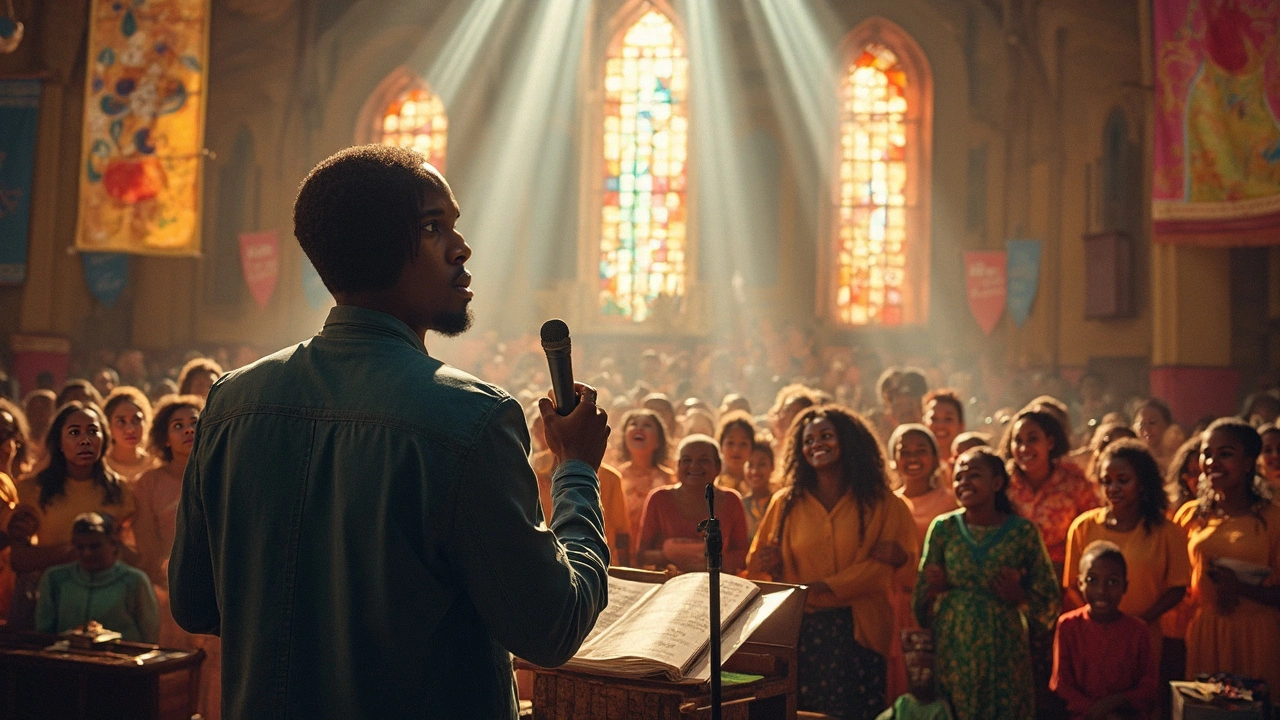Pentecostalism made its mark in South Africa in the late 1800s, riding the wave of revivals that were sparking religious excitement around the globe, from Europe to America. This movement was characterized by a fresh emphasis on Spirit baptism, a concept that grabbed the hearts of many. Picture early Pentecostals, advocating for healing and speaking in tongues, rebelling against the rigid structures of conventional churches. Back then, these churches often seemed like relics of the past, stuck in a rut.
The movement didn't just bring spiritual renewal but also gave birth to major denominations like the Apostolic Faith Mission and the Assemblies of God. Fast forward, and the Zion Christian Church emerges in 1925, not just as another church, but as South Africa's largest. Quite the journey, right?
But let's not sugarcoat history. During apartheid, Pentecostalism's role was complicated. Some white leaders supported the racial policies, while black leaders, like Nicholas Bhengu, stayed out of politics, focusing more on personal transformation and uplifting communities. Politics isn't everything, but post-1994, Pentecostal groups began to engage more, especially with the African Christian Democratic Party, pushing for conservative morals.
- Emergence and Influence of Early Pentecostalism
- Key Pentecostal Denominations
- Pentecostalism and Apartheid Era
- Women and Leadership in Pentecostalism
- Theological Focus and African Spirituality
- Pentecostalism's Modern Impact
Emergence and Influence of Early Pentecostalism
In the late 19th century, Pentecostalism planted its roots in South Africa, inspired by revival waves from across the oceans, particularly in Europe and the U.S. It wasn't just a religious movement; it was more like a vigorous shake-up that people found spiritually refreshing. It kicked off when leaders like Andrew Murray and Servaas Hofmeyr spoke out against the then-popular liberal theology, pushing this fresh outlook on spirituality.
What made Pentecostalism stand out? Well, it was its focus on that transformative experience called Spirit baptism. Imagine a spiritual awakening, marked by speaking in tongues and miraculous healings. This not only drew people in but also set the movement apart from what many saw as the "same-old" mainline churches at the time.
The Development of Major Denominations
The excitement wasn’t just about personal spirituality. It translated into the creation of major denominations. The Apostolic Faith Mission was founded in 1908, quickly followed by the Assemblies of God in 1909. Then came the Zion Christian Church in 1925, emerging as South Africa’s largest church after a split from Apostolic Faith Mission. These organizations helped to formalize what started as a loosely structured movement.
Why did this matter? It meant that Pentecostalism wasn't just a passing fad but a transforming force within the country's spiritual and cultural fabric.
Impact on Society
The influence of Pentecostalism was far-reaching, shaping not just the spiritual landscape but also encouraging egalitarian ideas. Women, who traditionally had limited roles in religious settings, found themselves stepping into leadership roles. This break from tradition was largely due to Pentecostalism’s inclusive nature, inviting laypeople to take active roles.
By the 2000s, this vibrant movement had grown exponentially, capturing roughly one-third of urban populations. Amazing how what started as small revivals grew into such a significant spiritual force, impacting not just individuals but whole communities!
Key Pentecostal Denominations
When we talk about Pentecostalism in South Africa, certain names come up time and time again. These are the denominations that have really carved out their place in the religious world here. Let's dive into some of the key players.
Apostolic Faith Mission
The Apostolic Faith Mission (AFM) is one of the big names. Founded in 1908, it was rooted in the powerful revivals that were a hallmark of that era. The AFM quickly molded itself into a significant spiritual hub, standing out with its emphasis on Spirit baptism and healing. This church was all about offering a vibrant alternative to what they saw as stale religious practices of the time.
"The Apostolic Faith Mission was not just a church, it was a movement," said church historian Michael Worsnip.
Assemblies of God
Next on the list, we've got the Assemblies of God (AOG), founded just a year later in 1909. This denomination brought its unique flavor to the movement, emphasizing community and personal spirit growth. The AOG has never been just about sermons and services; it centers around lived experience and personal transformation.
Zion Christian Church
The Zion Christian Church (ZCC) is another heavyweight in the Pentecostalism scene. Founded by Engenas Lekganyane in 1925 after splitting from the AFM, it has grown to be the largest church in South Africa. What's really interesting about the ZCC is how it incorporates traditional African spirituality with Pentecostal beliefs, making it resonate deeply with its followers.
These denominations have distinct characteristics, but they share a core focus on vibrant, personal faith experiences. All of them contribute to the diverse and dynamic landscape of South African Pentecostalism.
Here's a quick look at some key facts about these denominations:
| Denomination | Year Established | Key Emphasis |
|---|---|---|
| Apostolic Faith Mission | 1908 | Spirit Baptism |
| Assemblies of God | 1909 | Community and Growth |
| Zion Christian Church | 1925 | Traditional & Pentecostal Beliefs |
These churches aren't just about rituals and doctrines; they've made a significant impact on the social and cultural landscape of South Africa. They offer a place where spirituality meets everyday life, blending the past with the present in a way that speaks to many.
Pentecostalism and Apartheid Era
The Pentecostalism movement in South Africa navigated some tricky waters during the apartheid era. It's a period marked by racial tension and division, and religion wasn't exempt from these challenges. Most notably, many white Pentecostal leaders found themselves in a controversial spot by openly supporting apartheid, some even securing positions in the government. This support for racial segregation created a schism, not just within congregations, but also in public perception of the faith.
The Role of White Pentecostal Leaders
Among the white leaders in the Pentecostal movement, there was a mix of attitudes. While many aligned themselves with apartheid policies, ostensibly to preserve their positions and influence, a few felt compelled to remain apolitical, navigating a complex moral landscape. This choice often appeased those in power but alienated black congregants and leaders who were fighting for equality and justice.
Black Pentecostal Leaders' Approach
Black leaders had a different approach. A standout was Nicholas Bhengu, from the Assemblies of God, who kept his ministry away from political entanglements. His focus was on spiritual matters, enabling personal conversions and emphasizing community upliftment—essentially steering clear of power struggles. This apolitical stance provided a buffer for congregants who sought spiritual solace amid societal turmoil.
Despite this, the pressure of the era did lead to fractures. Many black congregants were passionate about fighting inequality and found the church's reluctance to engage in politics frustrating. Yet, the spiritual resilience and strong faith community established during this era laid groundwork for post-apartheid political engagement.
Pentecostalism Post-1994
Come 1994, with the end of apartheid, things started to shift. Pentecostals, once cautious of the political spotlight, began to find their voice. They engaged more actively, often through platforms like the African Christian Democratic Party, advocating values they hold dear. These included matters like conservative morals, reflecting a desire to shape the country’s future more in line with their faith.
This cautious evolution from political neutrality to increased engagement speaks volumes about the adaptive nature of Pentecostalism. It's a faith that's learned to walk the fine line between spiritual integrity and socio-political influence, ever striving to make a meaningful impact.

Women and Leadership in Pentecostalism
One of the unique aspects of Pentecostalism, especially in South Africa, is its open door policy when it comes to leadership roles for women. This isn't just a modern phenomenon; it's been part of the movement’s ethos from the get-go. Many Pentecostal churches saw the egalitarian approach as a breath of fresh air, a stark contrast to the more hierarchical and male-dominated religious groups of the time.
Women in South African Pentecostal churches didn't just take on traditional roles like Sunday school teachers or choir members. They stepped up as pastors, evangelists, and leaders, shaking things up and showing that leadership isn't confined to gender.
Trailblazing Female Leaders
History offers some inspiring stories of female Pentecostal leaders. For instance, Edith Miyeni, who was widely known in the Zion Christian Church (ZCC), played a considerable role in expanding women's influence and participation. Her leadership activities left a mark not only on the church but also on how gender roles were perceived in society.
Then there's Apostle Dr. Faith Muthambi from the Full Gospel Church of God. She broke through numerous barriers, showcasing that women leaders could bring transformative change and spiritual guidance, equal to their male counterparts.
Empowerment and Influence
The empowerment of women within Pentecostalism echoes deeply with the broader themes of freedom and spiritual growth. The movement inherently aligns with African spiritual traditions, which often emphasize community and equality. As a result, women have been able to influence not just religious practices but also community upliftment and social change.
The approachable nature of this faith, combined with its focus on the individual’s direct relationship with the Holy Spirit, creates a supportive environment for women to pursue leadership roles. This dynamic can be seen as a ripple effect—more women in leadership pave the way for a new generation to imagine themselves following the same path.
The Changing Landscape
Today, women's influence in South African Pentecostalism continues to grow. As societal attitudes shift and the church adapts to modern times, more women are taking on influential roles within their congregations. The egalitarian spirit that defined early Pentecostalism remains alive and well, offering a model for other religious movements worldwide.
Theological Focus and African Spirituality
Pentecostalism in South Africa has a unique theological flavor that blends traditional Christian elements with rich African spiritual practices. This secret sauce has made it resonate with many people in the region. The emphasis lies on spiritual warfare, deliverance ministries, and holistic empowerment, which align well with African cultural values and beliefs.
Let's talk about spiritual warfare first. It's a key concept where believers see their lives as a battleground between good and evil forces. It's a vivid, relatable idea in communities where the spirit world is a tangible reality. Stories of overcoming evil influences through the power of faith captivate and offer hope.
Closely linked is the idea of deliverance ministries. Here, the focus is on freeing individuals from spiritual oppression, whether it's through prayer, laying of hands, or spiritual counseling. This aligns with traditional African approaches to healing, which often include rituals to rid one's life of bad spirits or curses.
Empowerment through the Holy Spirit
Empowerment is not just a buzzword here. Pentecostals strongly believe in the Holy Spirit as a source of personal power, giving individuals the ability to transform their own lives and communities. This holistic view of empowerment encourages everything from bettering one's personal circumstances to building stronger, more resilient communities.
| Key Aspect | Description |
|---|---|
| Spiritual Warfare | Battle between good and evil forces, offering hope through faith |
| Deliverance Ministries | Focused on spiritual liberation akin to traditional healing practices |
| Empowerment | Holy Spirit as a source of change and personal strength |
By intertwining these South African Pentecostal beliefs with cultural practices, Pentecostal churches have become hubs of community life, not just houses of worship. They're part of the fabric of daily life, combining spiritual authority and cultural relevance, which is why they continue to attract millions today.
Pentecostalism's Modern Impact
Taking a closer look at today's Pentecostalism in South Africa, it's clear that the movement isn't just surviving; it's thriving. With around 30% of urban populations identifying as Pentecostals or charismatics, this movement has truly carved out a significant place for itself. You might wonder, what keeps such a movement relevant and growing?
The Urban Shift
First off, there's the urban shift. Cities in South Africa have seen rapid growth, and with them, the expansion of Pentecostal churches. These churches are often seen as community hubs, offering social connections and support networks which are crucial for urban dwellers who might feel isolated or overwhelmed by city life.
Cultural Resonance
Pentecostalism’s focus on spiritual empowerment reflects synchronistically with traditional African spirituality, making it especially appealing. This connection helps bridge modern Christian practices with age-old cultural beliefs, resonating with people on a profound level.
Political Engagement
Politically, Pentecostals have become more vocal and organized, particularly through entities like the African Christian Democratic Party. They push for policies that align with their conservative values, especially those relating to social issues and morality.
Innovative Practices
Pentecostal churches are known for their innovative and dynamic practices, often incorporating modern technology and media to engage followers. You’ll often find sermons streamed online or lively church services shared on social media, keeping the church accessible to a broader audience.
Strong Community Focus
Community remains at the heart of Pentecostalism's appeal. Churches provide not only spiritual guidance but also practical help — be it food programs, job training, or support groups. This holistic approach to empowerment makes a tangible difference in people’s lives.
The impact can be quantified to some extent, as seen in a recent study stating that Pentecostal churches have some of the highest growth rates among religious groups in the country. Let's not forget: South Africa's landscape is rich and varied, and Pentecostalism continues to adapt and flourish in stride with its ever-evolving cultural fabric.






Megan Riley
February 25, 2025 AT 21:19Wow, what a rich tapestry of history! The way Pentecostalism took root in South Africa is so inspiring-especially how it gave voice to people craving spiritual renewal. It’s amazing to see how movements like the Apostolic Faith Mission and the ZCC grew from humble revivals to massive community pillars. Keep digging into those stories, they really show the power of faith and resilience!!
Lester Focke
March 5, 2025 AT 08:13One must acknowledge the scholarly significance of the early 20th‑century theological ferment that precipitated such denominations. The doctrinal emphasis on Spirit baptism represented a profound epistemic shift within the African ecclesiastical landscape, warranting rigorous academic scrutiny.
Naveen Kumar Lokanatha
March 12, 2025 AT 19:06The inclusive nature of Pentecostalism really opened doors for many marginalized voices, especially women, which is a crucial point that often gets overlooked. It's also interesting how the movement dovetailed with African communal values, creating a unique syncretic practice.
Alastair Moreton
March 20, 2025 AT 05:59Honestly, some of those early leaders sounded more interested in power than genuine spirituality.
Surya Shrestha
March 27, 2025 AT 16:53The theological rigor of the early Pentecostal leaders, while commendable, occasionally betrayed a Eurocentric bias that undercut indigenous expressions of faith.
Rahul kumar
April 4, 2025 AT 04:46Yo, the modern impact is wild-these churches are like social hubs, offering food, jobs, and even tech classes. That kind of community support is why they keep growing fast in cities.
mary oconnell
April 11, 2025 AT 15:39When we parse the sociocultural matrix surrounding South African Pentecostalism, it's clear that the movement operates at the intersection of doctrinal elasticity and postcolonial identity formation. The early 20th‑century wave of Spirit baptism offered a theological vacuum that was rapidly filled by charismatic expressions, aligning neatly with indigenous concepts of ancestral reverence. This synergy catalyzed a diffusion of ecclesiastical structures that were simultaneously hierarchical and horizontally networked, facilitating rapid propagation across urban and rural locales. Moreover, the gender dynamics at play underscore a deliberate subversion of patriarchal ecclesial norms; women not only assumed liturgical roles but also assumed administrative authority, thereby recalibrating power vectors within congregational settings. The ZCC, for instance, exemplifies a syncretic praxis wherein African traditionalism coexists with Pentecostal pneumatology, fostering a hybrid spirituality that resonates with a broad demographic. From a theological standpoint, the emphasis on spiritual warfare and deliverance ministries dovetails with longstanding African cosmologies of good versus evil, rendering the movement's narrative both familiar and revolutionary. In the apartheid era, however, the movement's ambivalence-white leaders endorsing segregation versus black leaders opting for apolitical spiritual focus-reveals a complex ethical calculus where institutional survival often eclipsed prophetic activism. Post‑1994, the re‑engagement with political structures via entities like the African Christian Democratic Party illustrates an adaptive realignment of doctrinal imperatives with civic life. This re‑orientation underscores a broader pattern: Pentecostalism's capacity to modulate its public theology in response to shifting sociopolitical currents while preserving its core experiential ethos. Consequently, the modern urban shift-characterized by tech‑savvy worship experiences, livestreamed sermons, and vibrant community outreach-represents not merely a demographic swell but an ontological transformation of religious praxis. As these churches adopt digital platforms, they democratize theological discourse, allowing lay participation that further erodes traditional clerical gatekeeping. The holistic empowerment model-spanning spiritual, economic, and psychosocial domains-cements Pentecostal churches as pivotal agents of social capital formation in contemporary South Africa. This multifaceted impact, grounded in both historical continuity and innovative adaptation, positions Pentecostalism as a central node in the nation's ongoing narrative of resilience and renewal.
Michael Laffitte
April 19, 2025 AT 02:33Honestly, this whole story shows how faith can be a lifeline in chaotic times-massive respect.
sahil jain
April 26, 2025 AT 13:26The community programs are especially cool-like those job training sessions they run. It’s a solid example of faith in action, no emojis needed.
Bruce Moncrieff
May 4, 2025 AT 00:19Man, the way Pentecostalism blends traditional African spirituality with modern worship is absolutely mind‑blowing! It’s like watching history remix itself in real time!!!
Dee Boyd
May 11, 2025 AT 11:13Such moral clarity is essential in today's world.
Carol Wild
May 18, 2025 AT 22:06One cannot help but notice that the narrative presented glosses over the covert machinations of certain elites within the Pentecostal hierarchy, who, under the guise of spiritual guidance, have meticulously cultivated an extensive network of influence that pervades both ecclesiastical and secular spheres; this clandestine confluence of power and sanctity, often shrouded in doctrinal rhetoric, serves to perpetuate a subtle form of hegemony that subtly coerces adherence to a monolithic worldview while marginalizing dissenting voices, thereby engendering an environment wherein critical inquiry is systematically suppressed in favor of dogmatic conformity, a phenomenon that warrants rigorous examination and vigilant scrutiny.
Rahul Sharma
May 26, 2025 AT 08:59The cultural synthesis evident in South African Pentecostal worship underscores the importance of contextual theology; it's a vivid illustration of how African traditions infuse global religious movements with localized meaning.
Emily Kadanec
June 2, 2025 AT 19:53Just so you all know, the stats on church growth are way higher than what mainstream media admits.